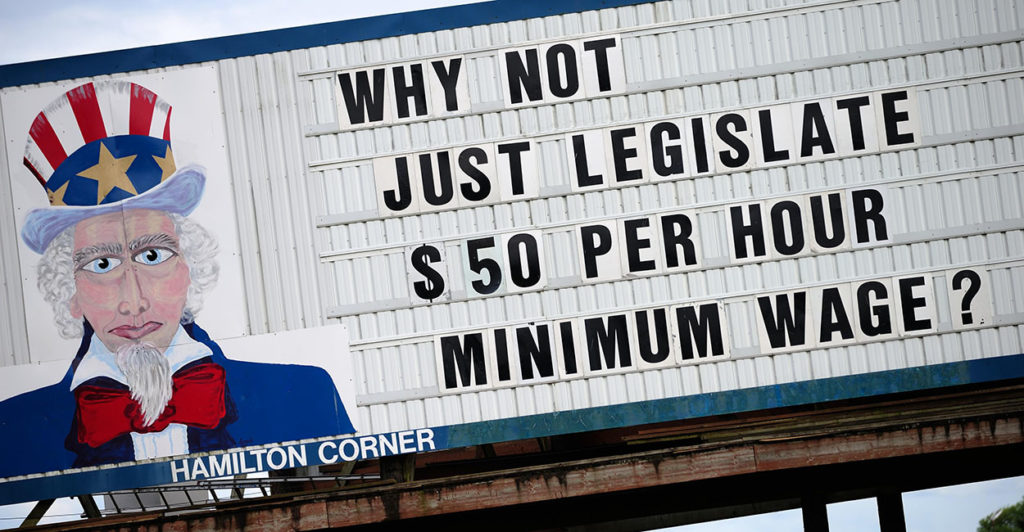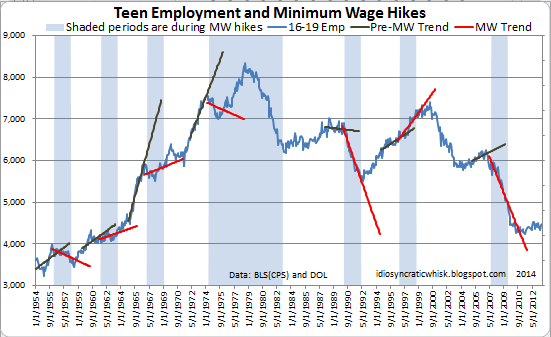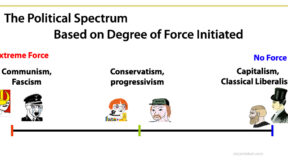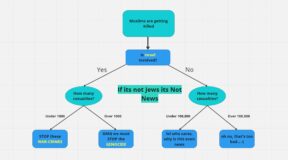
Those who are making minimum wage and are advocating for an increase, I can forgive. If they were knowledgeable about economics they probably wouldn’t be making minimum wage. This is why I am appealing to the higher-skilled higher wage earners who comfortably sit in their ivory towers advocating for a policy that will have no impact on them, and yet hurt the ones they are trying to help. As a thought experiment, take whatever you are making, let us say 30 dollars an hour, and set the minimum wage at double that rate. Do you think you deserve such a rate? Would you currently be able to attain such a rate on the market? Do you think if your boss was forced to pay such a rate, they would keep you or attain someone with more experience? If you currently can’t attain such a pay rate on the market, but someone else can, the likely hood is that you would eventually be replaced by that someone else. The truth is that at some minimum wage rate, no matter the skill level, we all become unemployable.
When someone mentions retail workers or fast-food workers they are most likely talking about abstract categories, not the real flesh and blood people that make up those categories. As stated, real flesh and blood people make up those categories, however, you have to realize that over time, those categories do not necessarily represent the same people. You can raise the wages of abstract categories by using a minimum wage policy, but you can’t help real flesh and blood people that make up that category this way. In fact, the flesh and blood people, the low-skilled labor actually gets hurt, because they are replaced by high skilled more productive employees or machines. So the categories, the retail workers or fast-food workers remain, and those categories now on paper will appear to make more money, but the real flesh and blood low skilled people you were trying to help are now gone, replaced, by higher-skilled labor. Take a concrete example like Costco. They pay nearly twice as much as Walmart, and as a result hire more productive, more skilled, and more helpful staff. If Walmart was forced to pay the same rate, they would hire the same level of skilled employees, and probably also cater to more affluent neighborhoods as Costco does. This does not help the real flesh and blood people you claim to care about.
The actual people who work for minimum wage, make up a small portion of our population, roughly 2%. Minimum wage policy directly affects them, however, those effects are not carried over to the larger economy and are not felt by the higher wage earners simply due to the fact that these effects are not large enough. For instance, an increase in minimum wage will make McDonald burgers more expensive, or raise the prices at Walmart, but higher wage earners already buy $9 burgers from other restaurants or fast food places and shop in stores like Jewel or Costco or even Whole Foods where the prices are already higher. High wage earners will hardly notice these changes. Similarly, the higher unemployment of low skilled workers due to higher minimum wages will not impact the employment of computer programmers, engineers, financial analysts, or any other high skilled high wage jobs.
Higher minimum wage rates, however, do in fact create unemployment within the low-skilled labor demographic. Below is a graph of teen employment. Why are we using teens as an example? Because they are an easily identifiable demographic of low experience low skilled labor that work around the minimum wage rates. Not all minimum wage employees are teens, however, they are harder to identify. You can however safely assume that they experience the same effect. Pretty much every move down in the employment of teens comes in the few months leading up to a minimum wage hike. Is there any other issue where the data conforms so strongly to basic economic intuition?” Low wages are really the only bargaining tool low skilled employees have to attain a job, when we force employers to pay a certain wage rate, we simply take their bargaining tool away. The result is that we hurt the people we intend to help. Instead of guaranteeing that they can earn a higher wage, we guarantee that they can’t earn anything at all. Please keep this in mind next time you choose which minimum wage policies to support.





